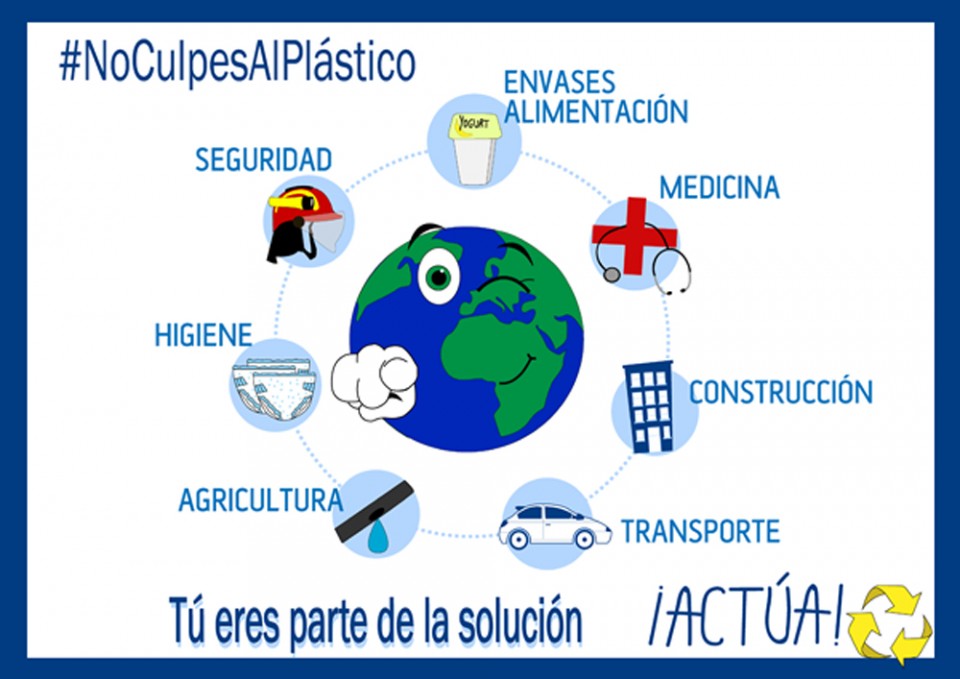#DoNotBlamePlastics: A campaign to raise awarness of the good use of plastics
In recent years, different extremist reactions against plastics have arisen that encourage people to renounce it and even ban it. Therefore, the plastics industry has come together to publicize 10 benefits that this type of material provides.
Plastics give us a lot, but seek very little in return.
1- Plastics are completely safe materials for our health
Plastics comply with the most demanding legislations and regulations at international, European, and national level. It is the material which is most subject to security controls worldwide.
2- Plastics keep food fresh and avoid food wasted
Ecodesign and innovation in plastic packaging allow us to consume food in a safer and more comfortable way as well as in better conditions. Moreoever, they contribute to reduce food waste, to extend the shelf life of products and to preserve their quality for longer.
Thanks to the use of suitable packaging, food waste is 3% in Europe and in developing countries (which use less packaging) it reaches 40%.
The necessary amount for packaging, for example a yogurt, is 4 times less if the material is made of plastic.
The lightless of packaging lowers 50% in the number of journeys, so that less fuel is consumed and less CO2 emissions into the atmosphere.
3- Plastics save lives
Modern medicine cannot be understood without plastics: advanced surgery technologies, scaffolds for the development of organs, disposable hygienic material, bionic applications, material for blood donation, transportation of basic supplies to the whole world.
Plastics also play a key rome in home security systems, anti-fire technologies, firefighters equipment, as well as in passive safety in cars with airbags and seatbelts, which are also made of plastics.
4- Plastics: Most of its applications are durable
60% of products made from plastic last from 5 to 50 years, or even more such as some applications in the building & construction sector.
Thanks to the durability of plastics, it is possible to make great resource savings. For instance, plastic housing insulation save 250 times more energy than was used to produce it.
5- Plastics do not deplete oil reserves
Only 4% to 6% of the European consumption of oil and gas is employed in the production of plastic materials.
More than 87% of oil is used as fuel for transportation and heating.
6- Plastics save water, energy and CO2 emissions
In the agricultural sector, the implementation of micro-irrigation allows saving from 30% to 60% of water compared to traditional irrigation.
In the transport sector, on average, a new car is made 15% of plastic components which saves 750 litres of fuel in 150.000 km. The plastic components of planes its weight and
7- Banning plastic products is not the solution to littering
Banning plastics and foregoing the advantages and benefits that these bring to society is not a realistic and effective solution to littering. The solution involves AWARNESS. In order to take full advantage, we must stop the leakage into the environment of any type of product, not only plastic products.
- 7 out of 10 Spaniards think that banning is not the solution.
8- The solution to marine litter lies in your responsible behaviour
Good management of waste is crucial for reducing marine litter.
%80 of marine litter comes form mainland.
96% of Spaniards think that the most effective measures against littering are education and awareness campaigns, combined with an increase of the number of containers and a more frequent collection.
9- Single-use plastics: Indispensable in some applications
The value of plastics goes beyond its useful life. They can be recycled and, in case that is not possible, used as alternative source for renewable energy. Moreover, single-use plastic applications meet our demands and needs. These are indispensable for hygiene, safety and food preservation
10- Reduce, reuse and recycle is everyone’s responsibility
Plastics are recycable materials which contribute to Circular Economy. In order to be recycled, it is important that you manage them correctly: separate waste properly and do not litter.
You are part of the solution. DO NOT BLAME PLASTICS. TAKE ACTION!
Fuente: AIMPLAS
At Congost Plastic, we actively collaborate in the implementation of initiatives to raise awarness about the proper use of plastics and we are interested in educational initiatives. Follow us on our social networks to find out about our projects.
SiguenosComparte




